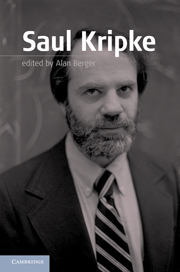Book contents
- Frontmatter
- Contents
- List of Contributors
- Introduction to Kripke
- Part I Naming, Necessity, and Apriority
- Part II Formal Semantics, Truth, Philosophy of Mathematics, and Philosophy of Logic
- Part III Language and Mind
- 9 Kripke’s Puzzle about Belief
- 10 A Note on Kripke’s Puzzle about Belief
- 11 On the Skepticism about Rule-Following in Kripke’s Version of Wittgenstein
- 12 Kripke on Color Words and the Primary/Secondary Quality Distinction
- Part IV Philosophy of Mind and Philosophical Psychology
- Index
- References
9 - Kripke’s Puzzle about Belief
Published online by Cambridge University Press: 05 June 2012
- Frontmatter
- Contents
- List of Contributors
- Introduction to Kripke
- Part I Naming, Necessity, and Apriority
- Part II Formal Semantics, Truth, Philosophy of Mathematics, and Philosophy of Logic
- Part III Language and Mind
- 9 Kripke’s Puzzle about Belief
- 10 A Note on Kripke’s Puzzle about Belief
- 11 On the Skepticism about Rule-Following in Kripke’s Version of Wittgenstein
- 12 Kripke on Color Words and the Primary/Secondary Quality Distinction
- Part IV Philosophy of Mind and Philosophical Psychology
- Index
- References
Summary
1
You are, of course, familiar with the story of Pierre. Raised in France, he acquires the name ‘Londres’ as a name of London. He accepts, in French of course, many claims about the city – elle est grande, jolie, dans Angleterre, and so on, and so forth. Spirited away to England, confined to an unpleasant part of London, forced to learn the language by speaking to the natives, he acquires ‘London’ as a name of London. He accepts, in English of course, many claims about the city – it is large, not at all pretty, in England, and so on, and so forth. He does not recognize that the city he is in is the city, Londres, of which he learned in France. He remembers, and continues to accept in French, all the claims he learned in France about Londres – qu’elle est grande, jolie, dans Angleterre, and so on.
Pierre’s experience in France warrants our saying that he believed that London is pretty. That, and the fact that he doesn’t seem to have changed his mind about what he learned in France, warrants our saying that he still believes that. Pierre’s experience in England warrants our saying that he believes that London is not pretty. This, Kripke claims, leads to a puzzle: “Does Pierre, or does he not believe that London is pretty? It is clear that our normal criteria for the attribution of belief lead, when applied to this question, to paradoxes and contradictions.”
- Type
- Chapter
- Information
- Saul Kripke , pp. 211 - 234Publisher: Cambridge University PressPrint publication year: 2011
References
- 3
- Cited by

